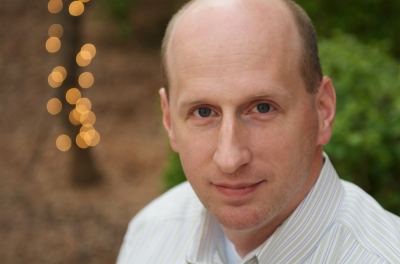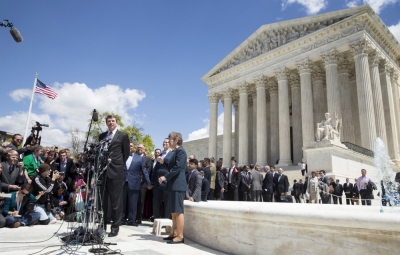Are Gay Activists Suddenly Worried About Justice Kennedy's Vote?

Oral arguments in Obergefell v. Hodges are now complete, and there is just a bit less triumphalism from the Left than expected. It turns out that Justice Kennedy — the presumed deciding vote — was not uniformly enthusiastic about expanding the definition of marriage, noting at one point that he had "a word on his mind, and that word is 'millennia.'" He seemed to be indicating reluctance to step in and redefine an institution that has existed across cultures, for thousands of years, as a union between a man and a woman.
While that comment was promising, most observers said he was far more animated and impassioned in his statement sympathetic to same-sex marriage. Later in the argument, for example, he spoke forcefully about granting "dignity" to gay couples. From The Wall Street Journal live blog:
He [Michigan special assistant attorney general John Bursch] again said the states' position focused on the importance of marriage for childbearing. The institution of marriage was never meant to be about bestowing dignity on couples, he said. This drew a sharp response from Justice Kennedy. "I thought the whole purpose" was to bestow dignity, he said.

That statement, in a nutshell, is why I remain pessimistic about the outcome. When a justice feels empowered to decide — virtually on his own — that the "whole purpose" of what even he acknowledges is an ancient institution is to "bestow dignity" on adult relationships, it's tough to see any form of rigorous constitutional analysis. Certainly some people see the primary role role of marriage as bestowing dignity — whatever that means — on a couple, it's simply not credible for anyone to believe that's objectively the "whole purpose" of the institution, especially since marriage unions typically produce children. Moreover, I don't see any express or implied constitutional obligation for the state to "bestow dignity" on any adult relationship.
If there is hope, however, it may lie — ironically enough – in an ominous exchange Joel Gehrke highlighted:
JUSTICE ALITO: Well, in the Bob Jones case, the Court held that a college was not entitled to tax exempt status if it opposed interracial marriage or interracial dating. So would the same apply to a university or a college if it opposed same-sex marriage?
GENERAL VERRILLI: You know, I I don't think I can answer that question without knowing more specifics, but it's certainly going to be an issue. I I don't deny that. I don't deny that, Justice Alito. It is it is going to be an issue.
Clearly, the Obama Administration is swinging for the fences here, and it may have gone too far. Justice Kennedy may take pride in his support for gay rights, but he's also somewhat libertarian in outlook and generally not a supporter of the use of state power to crush dissent. It was clear that a number of justices are concerned about the religious liberty implications of marriage redefinition, and they may have just the right lever to persuade Justice Kennedy to reach a compromise decision — one that recognizes same-sex marriage without creating a new constitutional right. If the court held there was no constitutional right to same-sex marriage but that states would have to recognize same-sex marriages from different states, the real-world effect is to render same-sex marriage lawful without creating a powerful new legal club to use against dissenting religious institutions. In other words, same-sex marriage would be legalized, not constitutionalized.
I'm not predicting or necessarily advocating such an outcome, but if Kennedy is at all concerned with religious liberty and free speech, it might be an outcome he considers. But all this is mere speculation. The Court will rule in June. The church should prepare for the worst.
This column orginally appeared in National Review.





















